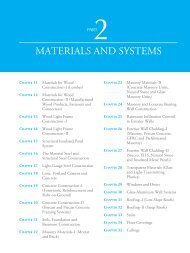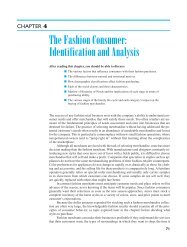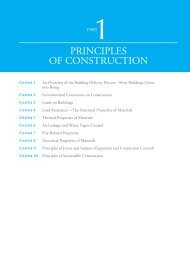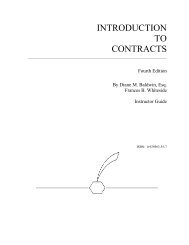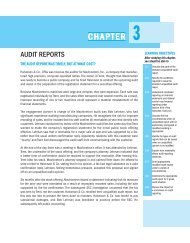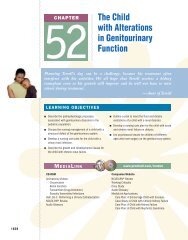A prolific painter of portraits before and after the French Revolution ...
A prolific painter of portraits before and after the French Revolution ...
A prolific painter of portraits before and after the French Revolution ...
Create successful ePaper yourself
Turn your PDF publications into a flip-book with our unique Google optimized e-Paper software.
ch07.qxd 12/2/04 11:59 AM Page 348<br />
348<br />
Chapter 7<br />
explaining<br />
as <strong>the</strong> first step in her semester portfolio project. Following this explaining essay, she<br />
wrote a persuasive essay, arguing against English-only legislation. For this initial<br />
essay, however, she focused on reading key articles about English only, exploring <strong>the</strong><br />
issues in each article, <strong>and</strong> explaining key arguments on both sides. Her goal was not<br />
to argue for one side or <strong>the</strong> o<strong>the</strong>r, but to explore <strong>the</strong> issues <strong>and</strong> explain <strong>the</strong> arguments<br />
on both sides <strong>of</strong> <strong>the</strong> English-only debate. As you read her essay, see if she explains <strong>the</strong><br />
major arguments for both sides in a clear <strong>and</strong> balanced manner.<br />
TEACHING TIP<br />
Perhaps <strong>the</strong> most exciting<br />
new teaching tool in <strong>the</strong><br />
classroom combines <strong>the</strong><br />
computer screen with <strong>the</strong><br />
overhead projector. Many<br />
schools now have portable<br />
computers that can project<br />
computer screens overhead<br />
so that <strong>the</strong> whole class can<br />
observe one student in <strong>the</strong><br />
actual process <strong>of</strong> revising.<br />
You do not have to be in a<br />
computer lab to use this<br />
technology. You just need<br />
<strong>the</strong> portable equipment<br />
<strong>and</strong> students who are drafting<br />
<strong>the</strong>ir essays on a compatible<br />
program. Ask a<br />
student to sit at <strong>the</strong> computer<br />
<strong>and</strong> actually make<br />
changes in his or her draft<br />
as suggested by <strong>the</strong> class.<br />
Prewriting for Topic Proposal<br />
The English-only issue is a very controversial issue. Some say America should<br />
adopt an <strong>of</strong>ficial language policy. O<strong>the</strong>rs think that this is a very racist idea. I<br />
have been reviewing reports <strong>of</strong> a recent vote on making Puerto Rico a state. Part<br />
<strong>of</strong> <strong>the</strong> legislation centered on making <strong>the</strong> people <strong>of</strong> Puerto Rico (which is predominantly<br />
Spanish-speaking) adopt English as <strong>the</strong>ir <strong>of</strong>ficial language. Supporters<br />
<strong>of</strong> this bill claim that it is necessary that <strong>the</strong> Puerto Ricans learn English<br />
to become Americanized. O<strong>the</strong>r people feel this will take away <strong>the</strong>ir language<br />
rights. Some people speculate that <strong>the</strong> English-only movement is a xenophobic<br />
reaction to <strong>the</strong> 1960 immigration amendments.These amendments made<br />
it illegal to restrict citizenship to America based on race. With this new amendment,<br />
<strong>the</strong>re has been an influx in immigrants from diverse places. This influx<br />
<strong>of</strong> people could lead to xenophobia (fear <strong>of</strong> strangers or foreigners). I feel this<br />
speculation may be true. In 1912, when New Mexico became a state, it was allowed<br />
to keep Spanish as its <strong>of</strong>ficial language provided that English was also<br />
an <strong>of</strong>ficial language. Why such a radical change in policy when Puerto Rico applies<br />
to be a state? Is America afraid that it will lose its identity to non-<br />
English-speaking people? America started out as a conglomerate <strong>of</strong> immigrants<br />
who did not all speak <strong>the</strong> same language. What now?<br />
I would like to explore this topic more. The two main positions on<br />
English-only legislation are as follows:<br />
1. English needs to be <strong>the</strong> <strong>of</strong>ficial language <strong>of</strong> <strong>the</strong> United States because<br />
we need one unifying language. Without English-only laws,<br />
immigrants will not learn English <strong>and</strong> will not contribute to society.<br />
2. It is unfair to expect current citizens in <strong>the</strong> United States to learn English.<br />
Making English <strong>of</strong>ficial will make people not learn o<strong>the</strong>r languages.<br />
I know some about this subject, but I haven’t done much research on<br />
my own. The questions I have are whe<strong>the</strong>r I could tie this into racism <strong>and</strong><br />
whe<strong>the</strong>r I will be able to get enough information in <strong>the</strong> library <strong>and</strong> on <strong>the</strong><br />
Internet.<br />
PROFESSIONAL COPY—NOT FOR RESALE



